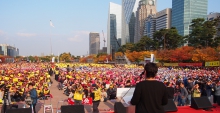South Korean workers fight for the right to retire in dignity

Under the pretext of reducing its pension deficit, and without proper consultation with the unions, the government has proposed a draft bill that will increase workers' contributes but will cut pensions and benefits from 2016.
South Korean president Park Geun-hye, who is well known for her anti-union statements, has claimed that such sacrifices are necessary “for future generations and for the country."
The Korean Government Employees' Union (KGEU) has rejected the proposal, since workers had already accepted low salaries in return of higher pensions after retirement, and might call a general strike in the coming weeks.
The attempt to dismantle the Government Employees Pension System is the ultimate attack on workers' rights, since the National Pension Service is already far from adequate and there are almost no protections for retired workers.
In addition to that, the government is pursuing an aggressive policy of privatization that entails anti-social reforms.
"In South Korea there is a systematic breach of labour rights: wages are too low, working hours are too long, and working conditions too tough,” said Rosa Pavanelli, general secretary of PSI, who joined the rally in Seoul.
“In order to add injustice to injustice, the Korean government is violating a fundamental right of workers: the right to a decent pension, the right to retire in dignity.”
The rally in Seoul was held at the end of the PSI Asia-Pacific forum on trade union rights, where 65 PSI affiliates from Australia, Bangladesh, Fiji, India, Indonesia, Japan, Malaysia, Mongolia, Nepal, Philippines, South Korea and Sri Lanka discussed about attacks to unions, privatisation and precarious work in the region.
“There is growing dissatisfaction and inequality due to the gap between the rich and the poor which may cause damage to the social fabric and peace of the world,” said V. Lakshmi, PSI Regional Secretary.
“As trade unions we have an important role to play, and we also have a great responsibility to protect our members from exploitation and victimization.”

